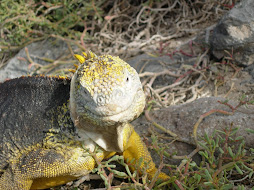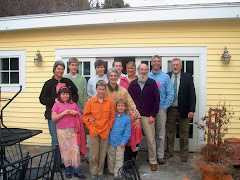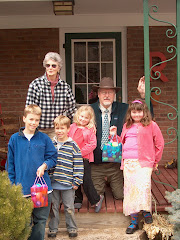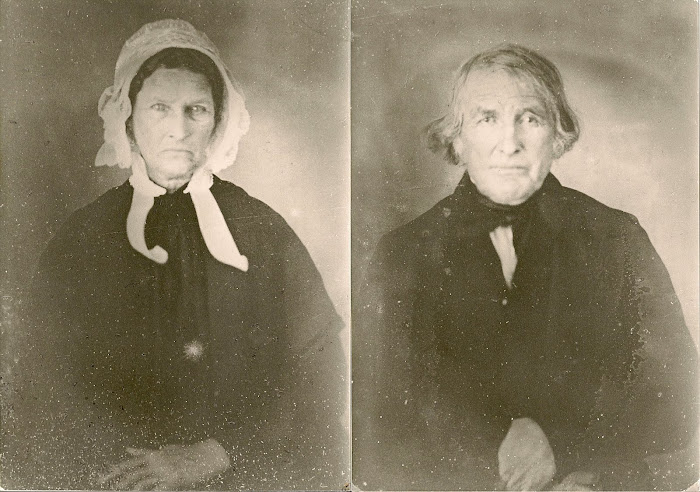Tuesday, June 3, 2008
Mom, Are We Related to Steve Nash?
It’s been fun, too, to trace the evolution of particular family surnames. For instance, if we look at the name McCurdy (Janet McCurdy married Robert Lithgow; their daughter Martha married Lt. James Dunning; their daughter Mary married William Reed Jr.) on the Reed side of the family, it is interesting to see how the name captures the evolution of surnames. In the late 14th century, a man named Ruari, or Roderick, dwelled on the Isle of Bute in Scotland. One name was sufficient. His son, named Macruari (son of Ruari), also had a son, named Gilkrist, who by this time had taken on the last name of his father, as well as the title Chieftan—of the Makurerdy clan, we presume. Clearly, the Isle of Bute was growing more crowded with more clans, and all those Donalds and Daniels and Fingals and Gilkrists needed more distinction, as clan warfare escalated.
With each generation, as the name is passed down from father to son (and we hope, to daughter, too), the name changes shape bit by bit, becoming more refined and distinct. Several generations later, Donald Makurerdy would have a son Donald, who would change his last name to MacKirdy. It is his son, Fingal, to whom this blog is dedicated. Fingal’s son Donald’s son Daniel’s son Daniel (have we lost you yet?) changed the name to McCurdy after he left Scotland for County Antrim, Ireland. It was Daniel McCurdy’s daughter Janet who left Ireland for the coast of Maine all those years ago.
Before Janet's time, there was a unique system of naming girls in Scotland. The feminine version of Mac, was Nc, an abbreviation of “nighean mhic” or “daughter of Mac”, which was attached to a woman’s surname, and sometimes further abbreviated to N’. If you care to read more about Scottish surnames, click here.
In the rest of the world, the use of true surnames—hereditary names used to distinguish one person from another—began first in southern areas of Europe, and then spread to the north. As well, the trend began with the nobility, sweeping through the northern gentry last. And, as we have seen many times, there were many people who retained altogether too many names, like Thomas Read did in 1575, when he was also known as "Clerk of the Green Cloth." Whatever that means.
We’ve researched many of our family surnames to see what they mean and where they are from. Here is a sampling of our findings:
SEWARD ~ High admiral, who kept the sea against pirates; from the sea, and ward; a keeper. This would be an example of a place name that was perhaps combined with an occupational name.
SHOVE ~ Variation of the Dutch “schave”, and from Middle English “schove”, probably from Old English “scufa”, to thrust or push. (We think, perhaps, that the earliest Shove was a playground bully, and his naming was an example of a negative descriptive name)
LAWTON ~ Settlement on or near a hill, or by a burial mound. Hlaw=hill, burial mound; Tun=enclosure, settlement. Habitational, or place name. Similar to Hurst, which is old English for a wooded hill, or Nash, a topographical name for someone who lived by an ash tree.
GARDNER ~ From Gartner (German); and Gardener, which in the middle ages would have been a cultivator of edible produce in an orchard or kitchen garden (as opposed to a frivolous ornamental garden). Occupational name, as Mason is.
DAMON ~ English, Scottish, Classical Greek, and then there’s this: daman="to kill" (ouch!), or from the French, D’Amont, “one who lives uphill.” That sounds a bit better. Could this be an example of a descriptive surname, one that grew from an earlier association with an ancestor who was a killer? Yikes. Fits Matt Damon’s Jason Bourne pretty well.
REED ~ Comes from Read, Reade and Rede before. Middle English for having red hair or a ruddy complexion, or living in a woodland clearing. In addition to being a descriptive name, Reed can also be a habitational name. I suppose that the original Rede might have satisfied all three requirements. Oh! You mean that William, with the red hair and skin, who lives in the woodland clearing down the way. You say he had a few too many last night? And later: Oh! You mean William the Red. Yea, that'd be he, pulling his beard out over nothing. And still later still: Oh! You mean William Rede. He is a good fellow. Ay, I do. And I did all along.
WATT ~ A short form of Walter. Scottish and English. Patronymic. Funny, we thought that it might have come about because some ancestor-dude was hard of hearing. What? Watt?
HITCHCOCK ~ “Hitch” was a pet name for Richard (no doubt, because there were so many of them during the 14th century), and “cock” meant young man. Put them together, and you can imagine a young man named Richard whom everybody called Hitch and who had a son named Richard (because, really, back then, what else was there to name your son?) whom everybody called Hitchcock…and all the babies were little Hitchcocks, and it stuck, and the rest is history!
ROOT ~ There’s much more to this tidy little name than we expected! Root comes from the English nickname for a cheerful person (rote=glad). As well, it was an occupational name for one who played the rote, an early medieval stringed instrument. And finally, it was a topographical name for someone who lived by a retting place.
As for MCCURDY, it means skilled seaman, a good thing to be when you’re traversing the rough seas and rocky channels along the Isle of Bute!
Go Behind the Name to research your own surname.
--ESG with DRP
Monday, June 2, 2008
William Who Shoves: The Evolution of Family Names and Origins
In the beginning, before billions of people roamed the earth, the scattering of people who eeked out a living in tiny villages were able to get by with just one name. Because of the remoteness of the population density, this custom--assigning just one name--was free of confusion and problems. But as the population rapidly increased, and more and more people inherited the same names, identities became mistaken, and it became too hard to find the person you were looking for.
In 14th century England, five names, William, Henry, John, Richard, and Robert, became so popular that two-thirds of the male population had one of them. To minimize the name confusions, people started associating other words and phrases with people's names to separate and distinguish them from others with the same name. Where you were born or where you had come from, what you looked like, what your occupation was, what your personality was like, and who your father was, all determined how people--neighbors and travelers--would refer to you and distinguish you from the other Williams, Henrys, Johns, Richards, and Roberts that shared soil with you. This was true in other European countries, too. In Norway and Denmark, if your father was Poul (Paul), and you were named Knut, you might have been called Knut Son of Poul, just to distinguish you from the Knut who was son of Thor, who lived just around the fjord. This is an example of a patronymic type of name, one that is derived from the father, and indicating "son of..." There were place or local names as well, that included habitational, topographic, and geographic references. Perhaps you lived next to a lake. You could be named Domenico Who Lives by the Lake, as opposed to the Domenico who lives by the woods. As well, sur names arose from descriptive nicknames, some of which may have started out as having a negative association and were later changed. For instance, what if you were not considered the nicest person in town? Well, unfortunately you could be named for your unkindness, and become known as John the Savage, perhaps, or the playground bully, William Who Shoves. The last type of name was an occupational name, and was based on what you did for work: Richard the Mason, Michael the Miller, Joseph the Smith.
As time went on, the phrases, which were a real mouthful for a time, became combined into easier, shorter beginnings of true surnames, that would start to be passed down generation to generation and would no longer be changed after 1500 AC. Son of Poul would be shortened to Poulsen, Domenico of Lago Marsino would become Domenico Lagomarsino (and later anglicized as Dominick Lake Marsins), and so on. Other family names such as Shove, our bully ancestors, were recreated as this naming revolution took the place of the phrased "last names."
We had fun dreaming up some combinations for ourselves; Daisy who catches rocks = Daisy Rocks, Elizabeth of the bountiful hair = Elizabeth Bounair, Dominick with the large heart = Dominick Large-Heart, Luke who plays on the links = Luke Links, James the buisness manager = James B-man, and last but not least, Mischief who eats mice = Mischief Mouse.
--L.G.P



